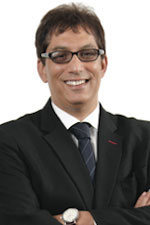
Top stories






LifestyleWhen to stop Googling and call the vet: Expert advice on pet allergies from dotsure.co.za
dotsure.co.za 2 days
More news
















Certainly, he has Murdoch's ability to say one thing and do an entirely different thing. Murdoch has never had any trouble promising to preserve editorial independence at the newspapers he has bought, like The Times of London, and then ripping it apart to serve his personal ambitions.

Survé told us he would invest and transform the Independent group into a true South African voice, and then proceeded to get rid of his most progressive - and some of his most able - editors and writers. The "amicable" parting of ways this week with The Star editor Makhudu Sefara is the most surprising of a growing list of group departees. Sefara had been vocal in his support for the purchase of Independent by local, black interests and harshly critical of those of us who asked questions of Survé. He was most recently named editor of the year in the Sikuvile Journalism Awards and is deputy chair of the South African National Editors' Forum (Sanef).
His departure appears to be not unrelated to Survé's tantrum last week after Sanef's prestigious Nat Nakasa Award went to Alide Dasnois, the respected editor Survé pushed out of the Cape Times. For the record, Sefara was not on the panel that chose the winner, although he did write a powerful piece asking if we had "the necessary courage and spirit of (James) Matthews, Nakasa and their generation ... or are we the sycophants, who kowtow to authority, be it political or corporate interests?" That was his last piece of writing as a Survé editor.
Murdoch ensured that all his newspapers and editors fell into line with his political views, which enabled him to snuggle up close to a range of different political leaders because he could give them the support of his powerful media empire in exchange for legal and regulatory favours. Biographer Bruce Page wrote of the "character of the Murdoch operation ... where journalists are uniquely ready to march in step, not incessantly ... (but) when the proprietor's passions, cupidity and interests are in play".
Survé, in his pronouncements and actions, appears to be cultivating a similar relationship with both his journalists and the authorities. Dasnois' dismissal came after a front-page story on an official report that raised questions about the conduct of some of Survé's fishing companies. It was not quite what the new owner had in mind.
Survé appears to have Murdoch's propensity to turn his newspapers into crude tools of his personal, financial, and political ambitions.
He has broken new records in devoting pages of his newspapers to interviews and pictures of himself, highlighting his struggle history, international connections and visionary business leadership - all done with a straight face. At the same time, he proclaims his commitment to editorial independence and journalistic excellence.
However, we have not yet seen whether Survé has Murdoch's most remarkable quality: his brilliance at growing a modest newspaper business into a media empire so powerful that it corrupted the journalism and politics of a number of countries.
Murdoch is steeped in newspapers and has shown a genius at making them work, even flourish, in difficult times.
He did it with cunning and ruthlessness, but also a deep understanding of the inner workings of media. Even those who hated him and the destruction he wrought in journalism had to admire his passionate capacity to make media succeed.
In all of the noise around Survé's squabbles with his editorial staff, we have not yet seen if he has a strategy to turn around a troubled, declining group of newspapers and chart a way into the digital future. The Independent group has had a late start in dealing with the many challenges of the industry and Survé has been promising to invest heavily to fix this.
What will matter most now is whether Survé - without many of the group's most experienced and respected people - can turn things around.
